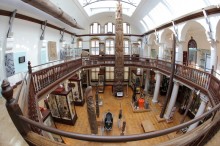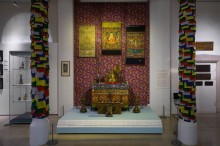University of Cambridge Museum of Archaeology & Anthropology, United Kingdom

 The University of Cambridge Museum of Archaeology & Anthropology is a research and teaching institution and a public museum that holds collections of national and international importance from every inhabited continent and throughout human history and prehistory.
Much of the collection was acquired through Cambridge-based research and speaks to histories of scholarship and colonialism in Britain and Europe as well as representing important aspects of the cultural heritage of communities worldwide.
Among the most famous ethnographic collections are those from the 18th-century Pacific voyages of Captain Cook, the founding collections from Fiji in the 1870s and material from the pioneering Cambridge Expedition to the Torres Strait and Sarawak in 1898.
Archaeological collections range from early hominid tools from East Africa almost two million years old to post-medieval finds from sites in and around Cambridge.
Permanent collections: The University of Cambridge Museum of Archaeology & Anthropology looks after approximately one million artifacts and photographs across archaeology and anthropology collections, with large holdings of material across Asia. Highlights include the collections of Naga art and artifacts and those from the Andaman and Nicobar Islands by Radcliffe-Brown and others, and the Williamson collection from Tibet.
The University of Cambridge Museum of Archaeology & Anthropology is a research and teaching institution and a public museum that holds collections of national and international importance from every inhabited continent and throughout human history and prehistory.
Much of the collection was acquired through Cambridge-based research and speaks to histories of scholarship and colonialism in Britain and Europe as well as representing important aspects of the cultural heritage of communities worldwide.
Among the most famous ethnographic collections are those from the 18th-century Pacific voyages of Captain Cook, the founding collections from Fiji in the 1870s and material from the pioneering Cambridge Expedition to the Torres Strait and Sarawak in 1898.
Archaeological collections range from early hominid tools from East Africa almost two million years old to post-medieval finds from sites in and around Cambridge.
Permanent collections: The University of Cambridge Museum of Archaeology & Anthropology looks after approximately one million artifacts and photographs across archaeology and anthropology collections, with large holdings of material across Asia. Highlights include the collections of Naga art and artifacts and those from the Andaman and Nicobar Islands by Radcliffe-Brown and others, and the Williamson collection from Tibet.
View all Asia-Europe Museum Network (ASEMUS) members in the United Kingdom
Similar content
posted on
21 Feb 2013
posted on
01 Feb 2012
02 Jun 2018 - 02 Jun 2018
posted on
25 Aug 2012
